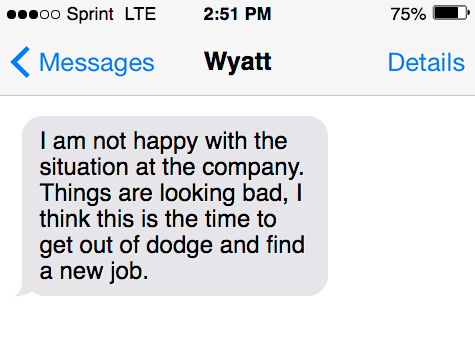What does “get out of dodge” mean? And why is it used in America? Does it refer to something positive or negative? And where did the origin of the idiom begin?
Get answers to these questions in this short idiom worksheet…
What does “get out of dodge” mean?
The dictionary meaning of the word dodge is “avoid.” But in this phrase, Dodge refers to a city in Kansas. The city was known for its shoot-outs between law enforcers and criminals. A radio serial used the phrase ‘get out of dodge’ to exhort criminals and the bad guys to leave the city of Dodge.
The original phrase was referring to bad people leaving a place. But the idiom ‘get out of dodge’ now refers to leaving a place quickly. It is not about just leaving a place but leaving it to avoid trouble. When a place is seen as being dangerous and not a nice place to be in, ‘get out of dodge’ means exiting quickly. “Getting out of dodge” or getting out of trouble.

Meaning to “depart” quickly
Some people even use the term to refer to departing from a place. But the implicit meaning is that the exit from the place is happening hurriedly or quickly. The intention is to avoid problems or go away to safety.
Getting out of dodge does not refer only to the bad guys hurriedly exiting. Anyone may find themselves in a situation where they need to leave a particular place. When they decide to leave quickly, they “get out of dodge.”
A person may anticipate troubles or difficulties that may come up in the future. If they decide to leave to avoid facing trouble, the situation can be termed as “getting out of dodge.”
Origins of “get out of dodge”
The origin of ‘get out of dodge’ can be traced to the radio drama “Gunsmoke.” The series started in the 1950s on the radio. Later on, its popularity led to it being televised. The series ran for nearly two decades.
The series was set in the Old West in Kansas State in Dodge City. The city had a bad reputation with gambling halls, saloons, brothels, and was overrun by criminals.
City reputations in the 1800’s inspiring “Gunsmoke”
Shootouts between criminals and law officers used to be common. This was during the 1870s. The period from July 1872 to July 1973 is considered very tough.
Later, law officers like Bat Masterson and Wyatt Earp brought a semblance of order.
They managed to get rid of the city’s bad reputation and made it a peaceful and respectable place.
The reputation of the city inspired writers who wrote shows featuring the city and all that happened there. The first film was a Hollywood movie made in 1914.
But it was the TV series “Gunsmoke” that made the idiom popular.
Gunsmoke the TV show and “get out of dodge”
In the series, the officer of the law is named Marshall Dillon. Through his mouth, the show’s writers brought out the phrase, ‘get out of dodge.’
The meaning was straightforward. The officer was warning criminals to leave the city. The phrase became popular and soon was used to refer to any situation where someone leaves a place quickly.
There are many references to the dangerous situation in the city. The revolver was said to be the only sign of law and order. Many articles and stories were lurid and over exaggerated the violence.
This added to the infamy Dodge City acquired. Getting out of Dodge became a popular expression that meant fleeing from a place.
Synonyms of “get out of dodge”
A few synonyms that could be used in place of “get out of dodge” are:
Antonyms of “get out of dodge”
Some antonyms that would convey the opposite meaning of “get out of dodge” include:
- Stay in place
- Remain here
- Be there to face the music
Examples of “get out of dodge” used in sentences
The following sentences explain how ‘get out of dodge’ can be used to convey its meaning perfectly:
- “The dark sky looked ominous, and a storm was clearly on its way. It was time to get out of dodge.”
- “I have taken loans from so many people, and they are all baying for my blood,” said Mark. “I think now is when I need to get out of dodge.
- “John realized that there was virtually no chance of getting a job. It was time to get out of dodge and move to another city.”
- “I am not happy with the situation at the company. Things are looking bad, I think this is the time to get out of dodge and find a new job.”
- “John said he was tired out of the rat race and was in dire need of a break. That was when Karen suggested getting out of dodge and relaxing with a vacation.”
Common questions
Questions about this idiom:
When did this catch phrase become an idiom?
In the second-half of the 20th century.
What does it mean to get a stern warning, “get out of dodge?”
It means that someone must evict the premises in order to maintain law and order. Think of the reference as to “leave town.” Or escape the premises. The popular television series “Gunsmoke” refers to the idiom and saying in this manner. “Heroes wanted these villians out of Dodge City, Kansas.”
Who played Marshal Matt?
James Arness.
Is the idiom still used today?
Yes. Urban Dictionary dates the popularity of the idiom back to 2005.
Sources
- Get Out Of Dodge synonyms – Power Thesaurus
- GET OUT OF DODGE in Thesaurus: 11 Synonyms & Antonyms
- Get out of Dodge Idiom Definition – Grammarist
- get out of Dodge – Wiktionary
- Get out of Dodge – Idioms by The Free Dictionary
- “Get Out Of Dodge” Definition with Useful Example Sentences
Inside this article
Fact checked:
Content is rigorously reviewed by a team of qualified and experienced fact checkers. Fact checkers review articles for factual accuracy, relevance, and timeliness. Learn more.
Core lessons
Glossary
- Abstract Noun
- Accusative Case
- Anecdote
- Antonym
- Active Sentence
- Adverb
- Adjective
- Allegory
- Alliteration
- Adjective Clause
- Adjective Phrase
- Ampersand
- Anastrophe
- Adverbial Clause
- Appositive Phrase
- Clause
- Compound Adjective
- Complex Sentence
- Compound Words
- Compound Predicate
- Common Noun
- Comparative Adjective
- Comparative and Superlative
- Compound Noun
- Compound Subject
- Compound Sentence
- Copular Verb
- Collective Noun
- Colloquialism
- Conciseness
- Consonance
- Conditional
- Concrete Noun
- Conjunction
- Conjugation
- Conditional Sentence
- Comma Splice
- Correlative Conjunction
- Coordinating Conjunction
- Coordinate Adjective
- Cumulative Adjective
- Dative Case
- Determiner
- Declarative Sentence
- Declarative Statement
- Direct Object Pronoun
- Direct Object
- Diction
- Diphthong
- Dangling Modifier
- Demonstrative Pronoun
- Demonstrative Adjective
- Direct Characterization
- Definite Article
- Doublespeak
- False Dilemma Fallacy
- Future Perfect Progressive
- Future Simple
- Future Perfect Continuous
- Future Perfect
- First Conditional
- Irregular Adjective
- Irregular Verb
- Imperative Sentence
- Indefinite Article
- Intransitive Verb
- Introductory Phrase
- Indefinite Pronoun
- Indirect Characterization
- Interrogative Sentence
- Intensive Pronoun
- Inanimate Object
- Indefinite Tense
- Infinitive Phrase
- Interjection
- Intensifier
- Infinitive
- Indicative Mood
- Participle
- Parallelism
- Prepositional Phrase
- Past Simple Tense
- Past Continuous Tense
- Past Perfect Tense
- Past Progressive Tense
- Present Simple Tense
- Present Perfect Tense
- Personal Pronoun
- Personification
- Persuasive Writing
- Parallel Structure
- Phrasal Verb
- Predicate Adjective
- Predicate Nominative
- Phonetic Language
- Plural Noun
- Punctuation
- Punctuation Marks
- Preposition
- Preposition of Place
- Parts of Speech
- Possessive Adjective
- Possessive Determiner
- Possessive Case
- Possessive Noun
- Proper Adjective
- Proper Noun
- Present Participle
- Prefix
- Predicate



